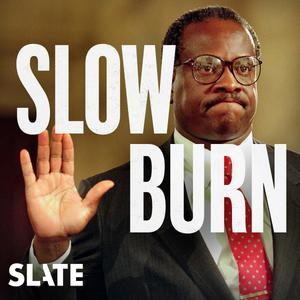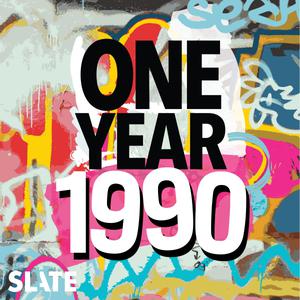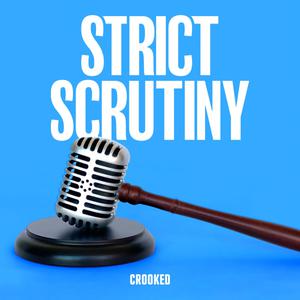
Slow Burn
History in real time
- 41 minutes 45 secondsDecoder Ring: Making Real Music for a Fake Band
Pop culture is full of fictional bands singing songs purpose-made to capture a moment, a sound. This music doesn’t organically emerge from a scene or genre, hoping to find an audience. Instead it fulfills an assignment: it needs to be 1960s folk music, 1970s guitar rock, 80s hair metal, 90s gangsta rap, and on and on.
In this episode, we’re going to use ‘Stereophonic,’ which just opened on Broadway, as a kind of case study in how to construct songs like this. The playwright David Adjmi and his collaborator, Will Butler formerly of the band Arcade Fire, will walk us through how they did it. How they made music that needs to capture the past, but wants to speak to the present; that has to work dramatically but hopes to stand on its own; that must be plausible, but aspires to be something even more.
The band in Stereophonic includes Sarah Pidgeon, Tom Pecinka, Juliana Canfield, Will Brill, and Chris Stack. Stereophonic is now playing on Broadway—and the cast album will be out May 10.
Thank you to Daniel Aukin, Marie Bshara, and Blake Zidell and Nate Sloan.
This episode was produced by Max Freedman and edited by Evan Chung, who produce the show with Katie Shepherd. Derek John is Executive Producer. Merritt Jacob is Senior Technical Director.
If you haven’t yet, please subscribe and rate our feed in Apple Podcasts or wherever you get your podcasts. And even better, tell your friends.
If you’re a fan of the show, please sign up for Slate Plus. Members get to listen to Decoder Ring and all other Slate podcasts without any ads and have total access to Slate’s website. Your support is also crucial to our work. Go to Slate.com/decoderplus to join Slate Plus today.
Learn more about your ad choices. Visit megaphone.fm/adchoices
24 April 2024, 7:00 am - 37 minutes 5 secondsDecoder Ring: Can the “Bookazine” Save Magazines?
Magazines have fallen on hard times – especially the weekly news, fashion, and celebrity mags that once dominated newsstands. The revenue from magazine racks has plummeted in recent years, and many magazines have stopped appearing in print or shut down altogether.
And yet, there is something growing in the checkout aisle: one-off publications, each devoted to a single topic, known as “bookazines.” Last year, over 1,200 different bookazines went on sale across the country. They cover topics ranging from Taylor Swift, Star Wars, the Kennedy assassination, K-pop, the British royal family, and as host Willa Paskin recently observed, the career of retired movie star Robert Redford.
In today’s episode, Willa looks behind the racks to investigate this new-ish format. Who is writing, publishing, and reading all these one-off magazines – and why? Is the bookazine a way forward for magazines, or their last gasp?
Voices you’ll hear in this episode include Caragh Donley, longtime magazine journalist turned prolific writer of bookazines; Eric Szegda, executive at bookazine publisher a360 media; and Erik Radvon, comic book creator and bookazine fan.
This episode was produced by Max Freedman and edited by Evan Chung, who produce the show with Katie Shepherd. Derek John is Executive Producer. Merritt Jacob is Senior Technical Director.
If you haven’t yet, please subscribe and rate our feed in Apple Podcasts or wherever you get your podcasts. And even better, tell your friends.
If you’re a fan of the show, please sign up for Slate Plus. Members get to listen to Decoder Ring and all other Slate podcasts without any ads and have total access to Slate’s website. Your support is also crucial to our work. Go to Slate.com/decoderplus to join Slate Plus today.
Learn more about your ad choices. Visit megaphone.fm/adchoices
10 April 2024, 7:00 am - 54 minutes 16 secondsDecoder Ring: Andrew Wyeth's Secret Nudes (Encore)
In 1986, Andrew Wyeth was the most famous painter in America. He was a household name, on the cover of magazines and tapped to paint presidents. And then he revealed a secret cache of 240 pieces of artwork, many provocative, all featuring the same nude female model. This collection, called The Helga Pictures, had been completed over 15 years and hidden from his wife, until they were revealed and wound up on the covers of both Time Magazine and Newsweek. The implication of these paintings were clear: Wyeth must have been having an affair, but then the story got complicated. Was it a genuine sex scandal? A hoax? Or something else entirely?
Some of the voices you’ll hear in this episode include Doug McGill, former New York Times reporter; Neil Harris, author of Capital Culture: J. Carter Brown, the National Gallery of Art, and the Reinvention of the Museum Experience; Cathy Booth Thomas, former Time Magazine correspondent; Gwendolyn Dubois Shaw, art historian and curator; Jeannie McDowell, former Time Magazine correspondent; Chris Lione, former art director at Art and Antiques; Joyce Stoner, Wyeth scholar; Peter Ralston, Wyeth photographer and friend; and Jim Duff, former director of the Brandywine River Museum.
This episode was written by Willa Paskin and produced by Willa Paskin and Benjamin Frisch. It was edited by Benjamin Frisch and Gabriel Roth. We had research assistance from Cleo Levin. Decoder Ring is produced by Evan Chung, Katie Shepherd, and Max Freedman. Derek John is Executive Producer. Merritt Jacob is Senior Technical Director.
A very special thank you to Paula Scaire.
If you haven’t yet, please subscribe and rate our feed in Apple Podcasts or wherever you get your podcasts. And even better, tell your friends.
If you’re a fan of the show, please sign up for Slate Plus. Members get to listen to Decoder Ring and all other Slate podcasts without any ads and have total access to Slate’s website. Your support is also crucial to our work. Go to Slate.com/decoderplus to join Slate Plus today.
Learn more about your ad choices. Visit megaphone.fm/adchoices
27 March 2024, 7:00 am - 42 minutes 54 secondsDecoder Ring: Why Stylists Rule the Red Carpet
Like a manager or an agent or a publicist, a stylist has become a kind of must-have accessory for well-dressed, A-list celebrities. It’s just expected that they will have hired someone to select the clothes they’ll wear at public appearances. But this was not always the case.
In today’s episode, Avery Trufelman, host of Articles of Interest, will guide us through the collapse of a certain kind of Hollywood glamor; to the rise of a growing, financially rewarding relationship between fashion designers and celebrity culture; and then onto the explosion in red carpet events patrolled by fashion police that helped create this new occupation.
This episode was produced by Avery Trufelman and Evan Chung, who produces Decoder Ring with Willa Paskin, Katie Shepherd and Max Freedman. Derek John is Executive Producer. Merritt Jacob is Senior Technical Director.
You’ll hear from Teri Agins, Dana Thomas, Melissa Rivers, and Jeanne Yang.
If you haven’t yet, please subscribe and rate our feed in Apple Podcasts or wherever you get your podcasts. And even better, tell your friends.
If you’re a fan of the show, please sign up for Slate Plus. Members get to listen to Decoder Ring and all other Slate podcasts without any ads and have total access to Slate’s website. Your support is also crucial to our work. Go to Slate.com/decoderplus to join Slate Plus today.
Learn more about your ad choices. Visit megaphone.fm/adchoices
13 March 2024, 7:00 am - 43 minutes 48 secondsDecoder Ring: The Gen X Soda That Was Just "OK"
Thirty years ago, a new kind of soda arrived in select stores. Instead of crowing about how spectacular it was, it offered up a liquid shrug, a fizzy irony. OK Soda was an inside joke for people who knew soda wasn’t cool. But what exactly was the punchline? In today’s episode, we’re going to ask how Coca-Cola, a company predicated on the idea that soda is more than ‘OK,’ ever bankrolled such a project. It was either a corporate attempt to market authenticity or a bold send-up of consumer capitalism; a project that either utterly, predictably failed or, perhaps more surprisingly, almost succeeded.
This episode was written by Willa Paskin. It was edited by Jenny Lawton. It was produced by Willa Paskin and Katie Shepherd, along with Evan Chung. Derek John is Executive Producer. Merritt Jacob is Senior Technical Director.
You’ll hear from Sergio Zyman, Brian Lanahan, Robin Joannides Lanahan, Charlotte Moore, Peter Wegner, Todd Waterbury, Dustin Ness, and Matt Purrington.
Special thanks to David Cowles, Art Chantry, Seth Godin, Jeff Beer, Gabriel Roth, Mark Hensley for all the OK Soda commercials and Mark Pendergrast, whose book For God, Country, & Coca-Cola was indispensable.
If you haven’t yet, please subscribe and rate our feed in Apple Podcasts or wherever you get your podcasts. And even better, tell your friends.
If you’re a fan of the show, please sign up for Slate Plus. Members get to listen to Decoder Ring and all other Slate podcasts without any ads and have total access to Slate’s website. Your support is also crucial to our work. Go to Slate.com/decoderplus to join Slate Plus today.
Learn more about your ad choices. Visit megaphone.fm/adchoices
28 February 2024, 8:00 am - 1 minuteAnnouncing Slow Burn Season 9
Hosted by Christina Cauterucci. Coming in May 2024.
Learn more about your ad choices. Visit megaphone.fm/adchoices
22 February 2024, 7:23 pm - 33 minutes 59 secondsDecoder Ring: Why Do So Many Coffee Shops Look the Same?
The eerie similarity of coffee shops all over the world was so confounding to Kyle Chayka that it led him to write the new book Filterworld: How Algorithms Are Flattening Culture. In today’s episode, Kyle’s going to walk us through the recent history of the cafe, to help us see how digital behavior is altering a physical space hundreds of years older than the internet itself, and how those changes are happening everywhere—it’s just easier to see them when they’re spelled out in latte art.
This episode was written by Willa Paskin and produced by Katie Shepherd. Decoder Ring is produced by Willa Paskin, Katie Shepherd and Evan Chung. Derek John is Executive Producer. Merritt Jacob is Senior Technical Director. Special thanks to Ben Frisch and Patrick Fort.
If you haven’t yet, please subscribe and rate our feed in Apple Podcasts or wherever you get your podcasts. And even better, tell your friends.
If you’re a fan of the show, please sign up for Slate Plus. Members get to listen to Decoder Ring and all other Slate podcasts without any ads and have total access to Slate’s website. Your support is also crucial to our work. Go to Slate.com/decoderplus to join Slate Plus today.
Learn more about your ad choices. Visit megaphone.fm/adchoices
14 February 2024, 8:00 am - 56 minutes 3 secondsOne Year: 1990 | 5. The Angry Death of Kimberly Bergalis
Before 1990, there had never been a documented case of a patient getting HIV from a health care worker. Kimberly Bergalis changed that. Her claim that she’d been infected by her dentist would captivate and terrify the country. And the dentist, David Acer, would be made into a villain without America ever knowing who he really was.
This episode was written by Kelly Jones and Josh Levin, One Year’s editorial director. One Year’s senior producer is Evan Chung.
This episode was produced by Kelly Jones and Evan Chung, with additional production by Olivia Briley.
It was edited by Joel Meyer and Derek John, Slate’s executive producer of narrative podcasts. Merritt Jacob is senior technical director. We had mixing help from Kevin Bendis. We had production help this season from Jabari Butler.
Join Slate Plus to get a special behind-the-scenes conversation at the end of our season about how we put together our 1990 stories. Slate Plus members also get to listen to all Slate podcasts without any ads.
Learn more about your ad choices. Visit megaphone.fm/adchoices
21 December 2023, 8:00 am - 58 minutes 14 secondsOne Year: 1990 | 4. Art on Trial
Robert Mapplethorpe was one of the most famous photographers in the world—and one of the most controversial. When his work came to Cincinnati in 1990, it would be at the center of a vicious fight over obscenity and the First Amendment, one that threatened the future of art in America.
This episode of One Year was written by Evan Chung, One Year's senior producer. It was produced by Kelly Jones and Evan Chung, with additional production by Olivia Briley.
It was edited by Josh Levin, One Year’s editorial director, with Joel Meyer and Derek John, Slate’s executive producer of narrative podcasts. Merritt Jacob is our senior technical director.
Join Slate Plus to get a special behind-the-scenes conversation at the end of our season about how we put together our 1990 stories. Slate Plus members also get to listen to all Slate podcasts without any ads.
Learn more about your ad choices. Visit megaphone.fm/adchoices
14 December 2023, 8:00 am - 40 minutes 44 secondsOne Year: 1990 | 3. Bush vs. Broccoli
In March 1990, a story broke that shocked the nation: George H.W. Bush had banned broccoli from Air Force One. The frenzy that came next would change the fate of a vegetable—and maybe even alter the course of a presidency.
This episode was written by Olivia Briley and Josh Levin, One Year’s editorial director. One Year’s senior producer is Evan Chung.
This episode was produced by Olivia Briley and Kelly Jones.
It was edited by Joel Meyer and Evan Chung.
Derek John is Slate’s executive producer of narrative podcasts.
Merritt Jacob is senior technical director.
Join Slate Plus to get a special behind-the-scenes conversation at the end of our season about how we put together our 1990 stories. Slate Plus members also get to listen to all Slate podcasts without any ads.
Learn more about your ad choices. Visit megaphone.fm/adchoices
7 December 2023, 8:00 am - 50 minutes 46 secondsOne Year: 1990 | 2. Mandrake the Magician
A middle-aged single dad in Chicago was outraged by all the cigarette billboards popping up in Black communities. In 1990, he picked up a paint roller and became an anti-tobacco vigilante. And he did it all under a secret identity.
This episode was written by Josh Levin, One Year’s editorial director. One Year’s senior producer is Evan Chung.
This episode was produced by Kelly Jones, Olivia Briley, and Evan Chung. It was edited by Joel Meyer and Derek John, Slate’s executive producer of narrative podcasts.
Merritt Jacob is our senior technical director. We had mixing help from Kevin Bendis.
Join Slate Plus to get a special behind-the-scenes conversation at the end of our season about how we put together our 1990 stories. Slate Plus members also get to listen to all Slate podcasts without any ads.
Learn more about your ad choices. Visit megaphone.fm/adchoices
30 November 2023, 8:00 am - More Episodes? Get the App
Your feedback is valuable to us. Should you encounter any bugs, glitches, lack of functionality or other problems, please email us on [email protected] or join Moon.FM Telegram Group where you can talk directly to the dev team who are happy to answer any queries.
 Pod Save America
Pod Save America
 Throughline
Throughline
 One Year
One Year
 Strict Scrutiny
Strict Scrutiny
 Political Gabfest
Political Gabfest
 Amicus With Dahlia Lithwick | Law, justice, and the courts
Amicus With Dahlia Lithwick | Law, justice, and the courts